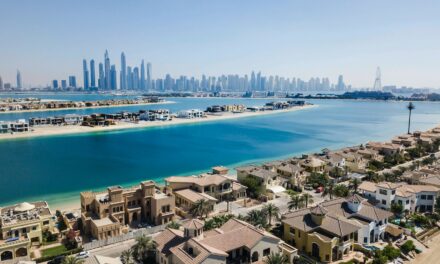I will write a brief introduction to an article about why Dubai does not have taxes.
Dubai is known for its luxurious lifestyle, stunning architecture, and a booming economy. One of the most significant advantages of living and working in Dubai is that it is a tax-free country. Many people are curious about how Dubai manages to exist without taxes and how it generates revenue. In this article, I will explore the reasons behind Dubai’s tax-free system and its impact on the economy and the expatriate community.
- Key Takeaways
- Understanding Tax-Free System in Dubai
- Historical Context of No Tax Policy
- Dubai’s Economic Model
- Revenue Generation in Dubai
- Impact on Expatriates
- Dubai’s Future Financial Strategy
- Frequently Asked Questions
- How does Dubai generate revenue without taxes?
- What are the tax incentives offered by Dubai?
- Is Dubai still tax-free and how long will it remain tax-free?
- What is the impact of Dubai’s tax-free status on its economy?
- How does Dubai’s tax-free status affect its real estate market?
- What is the corporate tax rate in Dubai?
Dubai’s tax-free system is a unique feature that sets it apart from other countries in the world. The government of Dubai has a strategic plan for revenue generation that does not rely on taxes. Dubai’s economic model is based on diversification, international trade, and tourism. The government has invested heavily in infrastructure, trade, and tourism, which has resulted in an increase in foreign investment and a growing economy. In the following sections, I will delve deeper into the historical context of Dubai’s no-tax policy and its future financial strategy.
Key Takeaways
- Dubai’s tax-free system is based on a strategic plan for revenue generation that does not rely on taxes.
- Dubai’s economic model is based on diversification, international trade, and tourism.
- Dubai’s no-tax policy has a significant impact on the economy and the expatriate community.
Understanding Tax-Free System in Dubai
Dubai is known for its tax-free status, which has been a key driver of its economic growth. As of August 2023, there is still no direct income or corporate tax in Dubai. However, there are some indirect taxes that generate revenue for the government, such as the Value Added Tax (VAT) and customs duties.
One of the main reasons why Dubai does not have income tax is that the government relies on other sources of income, such as oil and gas revenues, tourism, and real estate. The government has invested heavily in infrastructure and has created an attractive environment for foreign investment, which has helped to attract many multinational companies to Dubai.
Another reason why Dubai is tax-free is that it has established many free zones, which offer a range of incentives to businesses, such as 100% foreign ownership, no corporate tax, and no customs duties. These free zones are designed to attract businesses that operate in specific industries, such as technology, media, and healthcare.
In addition to free zones, Dubai also has a residency program for entrepreneurs and investors, known as the Dubai Entrepreneurship Visa. This program allows foreign entrepreneurs and investors to obtain a residency visa in Dubai, which gives them access to many benefits, such as tax-free income, no corporate tax, and no personal income tax.
Overall, Dubai’s tax-free system has been a key driver of its economic growth, attracting foreign investment and creating an attractive environment for businesses. While there are some indirect taxes in place, such as the VAT, the absence of direct income and corporate tax has made Dubai an attractive destination for businesses and investors alike.
Historical Context of No Tax Policy
The United Arab Emirates (UAE) has historically been a low-tax jurisdiction, with no income tax or corporate tax. The country’s economy has been largely driven by oil exports, which have provided a significant source of revenue for the government. However, in recent years, the UAE has been diversifying its economy and moving away from its reliance on oil.
In 2018, the UAE introduced a 5% value-added tax (VAT) on goods and services, which was a significant departure from its previous tax policies. The introduction of the VAT was part of a broader effort to increase government revenue and reduce the country’s dependence on oil exports.
In June 2023, the UAE will introduce a 9% corporate tax on businesses. This is another significant change to the country’s tax policies, which have traditionally been very business-friendly. The new tax is expected to generate significant revenue for the government and help fund the country’s ongoing economic diversification efforts.
Despite these recent changes, the UAE remains a very attractive destination for businesses and investors. The country’s strategic location, modern infrastructure, and business-friendly environment have made it a hub for international trade and commerce. The absence of income tax and corporate tax, along with other incentives such as free zones and low import duties, make the UAE an appealing destination for businesses looking to expand into the Middle East and North Africa (MENA) region.
Overall, the UAE’s no-tax policy has played a significant role in its economic development and success. While recent changes to the country’s tax policies may make it less attractive to some businesses, the UAE remains a highly competitive destination for investment and commerce.
Dubai’s Economic Model
Dubai’s economic model is based on attracting foreign investments, tourism, and trade. The government has implemented various policies and initiatives to create a business-friendly environment and attract foreign investors. One of the key factors that have contributed to Dubai’s success is its strategic location between Europe, Asia, and Africa, making it an attractive hub for trade and commerce.
Dubai’s government has focused on developing various sectors such as real estate, tourism, and financial services to diversify the economy and reduce reliance on oil revenues. The government has also established various free zones that offer tax exemptions, 100% foreign ownership, and other incentives to attract foreign investors. These free zones have played a significant role in attracting foreign investments and creating job opportunities.
Dubai’s economic model is also characterized by low tax rates and a business-friendly regulatory environment. The government has implemented various measures to reduce the cost of doing business, such as reducing bureaucracy, streamlining procedures, and providing incentives for businesses. For example, businesses in Dubai are not subject to corporate income tax, personal income tax, or value-added tax (VAT).
In conclusion, Dubai’s economic model is based on attracting foreign investments, tourism, and trade, and the government has implemented various policies and initiatives to create a business-friendly environment. The low tax rates, business-friendly regulatory environment, and strategic location have contributed to Dubai’s success as a hub for trade and commerce.
Revenue Generation in Dubai
Dubai is known for its tax-free economy, but how does it finance itself without taxes? The government of Dubai generates revenue through various non-tax sources, including fees, levies, and charges on services such as licensing, customs, property registration, tourism-related activities, and more. In this section, I will explore the different sources of revenue generation in Dubai.
Oil Revenue
Dubai is one of the seven emirates of the United Arab Emirates (UAE), which is a major oil-producing country. While Dubai itself is not a major oil producer, it does receive a share of the oil revenue generated by the UAE. The oil revenue is used to fund the country’s infrastructure projects, including the development of roads, airports, and seaports.
Tourism Revenue
Tourism is one of the main sources of revenue for Dubai. The city has become a popular destination for tourists from around the world, thanks to its luxurious hotels, shopping malls, and entertainment venues. The government of Dubai has invested heavily in the tourism sector, building world-class attractions like the Burj Khalifa, the Dubai Mall, and the Palm Jumeirah. The revenue generated from tourism is used to fund the city’s development projects and to provide services to its residents.
Real Estate Revenue
Dubai’s real estate sector has been a major contributor to the city’s economy. The government of Dubai has encouraged foreign investment in the real estate sector by offering tax incentives and other benefits. The revenue generated from real estate transactions, including property sales, rentals, and leasing, is used to fund the city’s development projects.
Trade Revenue
Dubai’s strategic location at the crossroads of Europe, Asia, and Africa has made it a major trading hub. The city’s ports and airports are among the busiest in the world, handling millions of tons of cargo every year. The revenue generated from trade, including customs duties and other fees, is used to fund the city’s development projects.
In conclusion, Dubai’s tax-free economy is supported by a variety of revenue sources, including oil, tourism, real estate, and trade. The government of Dubai has been successful in diversifying the city’s economy, making it less reliant on oil revenue. As a result, Dubai has become one of the fastest-growing cities in the world, attracting investors, entrepreneurs, and tourists from around the world.
Impact on Expatriates
As an expatriate in Dubai, the absence of income tax can have a significant impact on your finances. Without having to pay income tax, you can enjoy a higher disposable income and potentially save more money. This has made Dubai an attractive destination for skilled expats from all over the world who want to grow their personal wealth without tax reductions.
Moreover, the absence of income tax has also made Dubai an attractive location for businesses. Companies can offer their employees higher net salaries, which can help attract and retain top talent. This is especially true for small and medium-sized enterprises (SMEs) that are looking to compete with larger companies in the region.
However, it is important to note that while there is no income tax, there are other taxes in Dubai that expatriates need to be aware of. For example, Value Added Tax (VAT) was introduced in 2018, which is a tax on goods and services sold in the country. The current VAT rate in Dubai is 5%, which is significantly lower than the average VAT rate in other countries.
Expatriates may also have to pay other taxes such as property levies and tourism taxes. For instance, tourists are charged a tourist fee of 7 to 20 dirhams per night, depending on the hotel category. It is important to factor in these taxes when budgeting for your expenses in Dubai.
Overall, the absence of income tax in Dubai has had a positive impact on expatriates. It has made Dubai an attractive destination for skilled expats who want to grow their personal wealth without tax reductions. However, it is important to be aware of other taxes that may apply in Dubai when budgeting for your expenses.
Dubai’s Future Financial Strategy
Dubai’s future financial strategy is aimed at maintaining its competitive edge as a global business hub while ensuring sustainable economic growth. The government has identified several key areas that will drive the city’s economy in the coming years, including technology, healthcare, education, and innovation.
To support these sectors, the government is investing heavily in infrastructure, research and development, and human capital. The Dubai Future Foundation, for example, is focused on developing cutting-edge technologies and promoting innovation across various industries.
Another key aspect of Dubai’s future financial strategy is diversifying its sources of revenue. While the city has traditionally relied on oil and gas exports, the government is now looking to reduce its dependence on these industries and shift towards more sustainable sources of income.
One way the government is doing this is by promoting tourism and hospitality. Dubai is already one of the world’s top tourist destinations, and the government is investing heavily in expanding its tourism infrastructure and promoting the city’s attractions to a global audience.
Finally, Dubai is also looking to increase its competitiveness by reducing business costs and improving the ease of doing business. One way it is doing this is by continuing to maintain a business-friendly regulatory environment with no corporate or income taxes. Additionally, the government is investing in smart technologies to streamline business processes and reduce bureaucracy.
Overall, Dubai’s future financial strategy is focused on maintaining its position as a global business hub while reducing its dependence on traditional industries and diversifying its sources of revenue. With its strategic investments in key sectors and commitment to a business-friendly environment, Dubai is well-positioned to continue its growth and success in the years to come.
Frequently Asked Questions
How does Dubai generate revenue without taxes?
Dubai generates revenue without taxes through other means such as fees, fines, and other government charges. For example, the Dubai government charges fees for services like healthcare, education, and transportation. Additionally, Dubai has a thriving tourism industry, which brings in a significant amount of revenue through hotel taxes and other tourism-related fees.
What are the tax incentives offered by Dubai?
Dubai offers a range of tax incentives to attract foreign investment and businesses. For example, businesses in certain free zones in Dubai are exempt from corporate tax and customs duties. Additionally, Dubai offers tax residency programs for individuals and businesses, which can provide significant tax benefits for those who qualify.
Is Dubai still tax-free and how long will it remain tax-free?
Yes, Dubai is still tax-free for individuals and businesses. However, it is important to note that Dubai has introduced a Value Added Tax (VAT) of 5% on certain goods and services. It is unclear how long Dubai will remain tax-free, as this is subject to change depending on the economic and political climate.
What is the impact of Dubai’s tax-free status on its economy?
Dubai’s tax-free status has had a significant impact on its economy, attracting foreign investment and businesses. The absence of income and corporate taxes has made Dubai an attractive destination for entrepreneurs and businesses looking to minimize their tax burden. Additionally, Dubai’s tax-free status has helped to create a business-friendly environment, which has contributed to the growth and development of the city’s economy.
How does Dubai’s tax-free status affect its real estate market?
Dubai’s tax-free status has had a significant impact on its real estate market, making it an attractive destination for property investors. The absence of property taxes has made it easier for investors to generate rental income and profits from property sales. Additionally, Dubai’s tax-free status has helped to create a stable and predictable real estate market, which has contributed to the growth and development of the city’s property sector.
What is the corporate tax rate in Dubai?
Dubai does not have a corporate tax rate for most businesses. However, certain businesses may be subject to taxes and fees depending on their activities and location. For example, businesses operating outside of free zones may be subject to corporate tax and customs duties. Additionally, businesses dealing in products considered harmful by the UAE government, such as tobacco and energy drinks, may be subject to a 50-100% tax.

























